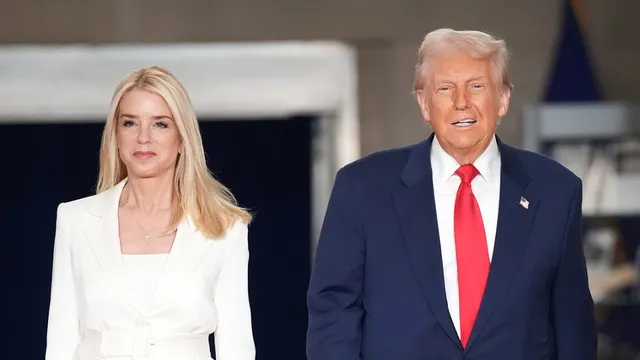
Trump empowers DOJ to punish immigration lawyers for misconduct
2025-03-24 03:08- Donald Trump has instructed Attorney General Pam Bondi to seek sanctions against immigration lawyers accused of misconduct.
- The memo claims that these lawyers are undermining national security by coaching clients on false asylum claims.
- The administration's actions raise concerns about the intimidation of legal representatives and judicial independence.
Express your sentiment!
Insights
In a recent directive, former President Donald Trump instructed Attorney General Pam Bondi to enforce sanctions against immigration lawyers and law firms perceived to be violating courtroom rules and regulations governing attorney conduct. This memorandum outlined concerns regarding the alleged coaching of clients to lie about their circumstances when asserting asylum claims, which Trump argued threatens national security and undermines the integrity of the immigration system. The memo emphasized that misconduct by lawyers is not an isolated issue but rather a pervasive problem affecting the legal framework of the country. Trump’s memorandum cites the practices of prominent attorneys, specifically pointing out Marc Elias, a well-known Democratic lawyer, and his association with the creation of a controversial dossier that was used during the 2016 election. The document allegedly contained false information intended to incite investigations against Trump’s campaign, further complicating the legal landscape and often making significant headlines. By framing these actions as unethical, the administration seeks to justify punitive measures against those who defend clients with asylum claims or engage with immigration courts. The repercussions highlighted in the memo indicate severe penalties for firms that engage in practices considered improper or detrimental to the administration's objectives. One significant punishment detailed includes the loss of security clearances for lawyers affiliated with certain firms, resulting in their potential removal from government contracts and bans from Federal buildings. Trump's administration has taken these critical steps to discourage legal representatives from opposing his interests, effectively making it difficult for opponents to find adequate legal representation. Additionally, there is growing concern about the environment created for judges and lawyers who handle cases under the Trump administration. Reports indicate an atmosphere of intimidation, where lawyers representing opposing sides receive threats, potentially discouraging them from taking necessary legal action. The broader implications of Trump's approach to the legal profession suggest a disturbing trajectory for the judicial system as it struggles between upholding the rule of law and navigating political interests. In conclusion, Trump’s efforts to undermine legal representation are emblematic of a broader trend of executive overreach, which has significant consequences for the legal system and democracy at large.
Contexts
In recent years, discussions surrounding immigration in the United States have increasingly gained attention, particularly regarding the legal practitioners who navigate the complex immigration system. Immigration lawyers serve a crucial role in ensuring that individuals seeking help with their immigration status, asylum, or citizenship have access to fair representation and legal counsel. However, recent rhetoric surrounding the legal profession, particularly from political figures such as former President Donald Trump, has raised significant concerns about the treatment and perception of immigration lawyers within the broader context of immigration policy and reform. Trump's administration has established a track record of adopting a hardline stance on immigration, which has included unfounded attacks on various stakeholders, including immigration lawyers who advocate for the rights of vulnerable populations. These attacks have often manifested through public statements, social media posts, and policies that frame immigration lawyers as impediments to the 'success' of strict immigration enforcement. This type of rhetoric creates a challenging environment for immigration lawyers and their clients, who face increased scrutiny and pushback from those in power in the midst of ongoing policy debates about immigration reform. The implications of this environment are profound, as they not only create barriers for legal practitioners in performing their duties but also contribute to a culture of fear among immigrants seeking justice and stability. By undermining the legitimacy of immigration lawyers, political figures risk eroding the foundational principles of justice and representation that underpin the American legal system. Furthermore, the portrayal of immigration lawyers as antagonists in the pursuit of national security often oversimplifies a complex issue, leading to misconceptions among the public. As a result, the essential work done by immigration lawyers to defend the rights of their clients may be overshadowed by negative stereotypes and unfounded accusations. The commitments of these legal professionals to uphold human rights and advocate for the most vulnerable in society must be recognized in light of the political narratives surrounding immigration. Recognizing and supporting the essential role immigration lawyers play is vital for maintaining a fair legal system. The challenges posed by political rhetoric will continue to shape the landscape of immigration law and policy in the United States, and it is imperative for stakeholders within the legal community and public sphere to encourage constructive dialogue that prioritizes justice, equity, and the fundamental rights of all individuals, regardless of their immigration status.